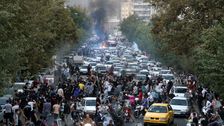Activism and BDS Beat
28 June 2016

Presbyterians overwhelmingly adopt report that calls for rights-based approach and criticizes singular focus on two-state solution.
APA images
Over the weekend, the Presbyterian Church USA endorsed a slate of resolutions reaffirming the 1.7-million strong denomination’s commitment to Palestinian rights.
At its last national conference in 2014, the church’s decision-making assembly voted to divest from Caterpillar, Hewlett-Packard and Motorola Solutions, companies that profit from and assist Israel’s military occupation of the Palestinian people.
This year, a resolution calling on the real estate company RE/MAX to stop selling properties in Israeli settlements is one of five measures that garnered overwhelming support within the church.
Leading up to the vote, the CEO and co-founder of RE/MAX, Dave Liniger, sent a letter to members of the church’s Israel/Palestine Mission Network announcing the company had “recently taken action to ensure that RE/MAX, LLC will no longer receive any income from the sale of Jewish settlement properties in the West Bank.”
But advocates nevertheless pursued the resolution. “RE/MAX must follow up this statement with concrete action to fully end its complicity in Israel’s occupation and theft of Palestinian land,” said Marita A. Mayer, an advocate of the resolution.
The real estate market for new settlement homes in the occupied West Bank, in which RE/MAX actively participates, has grossed $9.5 billion in recent years, according to a lawsuit filed in March.
Affirming boycotts
In addition, the general assembly voted to recognize boycotts as a legitimate means of nonviolent resistance.
Another resolution condemning the “systematic patterns of ill treatment and torture within the Israeli military detention system,” of Palestinian children was passed with nearly 85 percent in support.
Robert Trawick, a member of the Israel/Palestine Mission Network (IPMN), a peace and justice advocacy group of church members, reported that delegates rejected proposals to add language to some of the resolutions that equated the boycott, divestment and sanctions movement with anti-Semitism.
“From our perspective at IPMN, one of the great stories from the conference is that the church was given the opportunity to categorically reject BDS and they did not take the bait,” Trawick reported.
But the vote that has drawn the most ire from Israel advocacy groups is one that lifts the emphasis from the two-state solution as the goal of advocacy in the region.
Following the divestment vote in 2014, the church formed a team of experts to assess the two-state solution in light of developments on the ground in Palestine.
The group produced a report titled, “Israel-Palestine: For Human Values in the Absence of a Just Peace,” that argued for a rights-based approach to advocacy in Israel and Palestine as opposed to one that focused on a political solution.
While the report does not reject the two-state solution, it remarks on the damage it has caused.
“For years, abstract discussion of two- vs. one-state solutions or federations has served to distract attention from on-going violations of human rights and increases in mutual hostility,” the report states.
“In this situation, the Church should foster relationships with partners who share its values … without being misled by mirages of peace agreements ungrounded in realism about power.”
According to Trawick, representatives from the liberal Zionist lobby group J Street attended the national conference and focused their efforts on defeating this report. Nonetheless, the general assembly overwhelmingly voted to endorse it.
The Anti-Defamation League expressed disappointment after the church’s vote.
“Any alternative to the two-state solution to the Israeli-Palestinian conflict would mean the demise of Israel as a Jewish and democratic state, a view that is offensive to millions of Israelis and Jews around the world,” David Sandmel, the ADL’s director for interfaith relations said.
Furthermore, a last-minute proposal to dissociate the church from the US Campaign to End the Israeli Occupation failed to advance to a general vote in favor of a “prayerful study” on the BDS movement.
A proposal for individual members of the church to abstain from purchasing HP products, such as computers and printers, failed to pass.
The resolutions that were voted on this weekend were proposed by congregations across the country. In order for a resolution to be considered by the general assembly it must reach a certain threshold of local and regional support.
Trawick told The Electronic Intifada that one proposal that sought to reverse the 2014 divestment resolution failed to garner enough local support to reach the national vote.
Unitarian Universalists
Separately, on Saturday, the Unitarian Universalist Association (UUA) narrowly voted down a resolution that would prevent future investment in corporations complicit in the violation of human rights in the occupied West Bank and Gaza Strip.
The measure received the votes of 54 percent of the delegates at the general assembly in Ohio and 67 percent of off-site delegates. But this was short of the two-thirds needed to pass.
The resolution was initially written as a divestment resolution, targeting five corporations that “directly profit from or support the occupation and its abuses of Palestinian human rights.”
However, shortly prior to the vote, the religiously diverse denomination’s Committee on Socially Responsible Investing adopted new human rights standards that removed three of the five targeted companies from their list of investments.
The UUA did not have any investments in the other two corporations.
Ahead of the vote, Rabbi Rick Jacobs, the president of the Union for Reform Judaism, gave an unplanned speech denouncing the BDS movement, and claiming that “the overwhelming majority of your American Jewish brothers and sisters oppose BDS.”
Jacobs also warned that the resolution would damage UU-Jewish relations.
The Unitarian Universalists for Justice in the Middle East emphasized that receiving a majority of support for the resolution established a “firm grounding for future work on advancing justice for Palestinian rights.”
“[Unitarian Universalists] achieved actual divestment faster than expected and today UUJME’s resolution got a majority vote,” Anna Baltzer, an organizer with the US Campaign to End the Israeli Occupation, told UUJME.
“Usually, it takes years. The fact you got this in one year is amazing.”
Tags
Source Article from https://electronicintifada.net/blogs/charlotte-silver/presbyterian-church-rejects-effort-ostracize-bds
Related posts:
Views: 0
 RSS Feed
RSS Feed

















 June 29th, 2016
June 29th, 2016  Awake Goy
Awake Goy 





 Posted in
Posted in  Tags:
Tags: 

















Add new comment